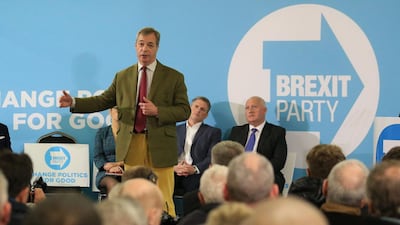Brexit party leader Nigel Farage has thrown down the gauntlet to Britain’s leading parties by registering more than 300 candidates to fight the opposition Labour party in next month’s election, despite warnings that he could cost the Conservatives a majority with his strategy.
After the Brexit party agreed earlier this week to not run in the 317 Tory-held seats in the upcoming election, Mr Farage has been under pressure from the Conservatives to not have candidates run in Labour seats. Such a strategy would make a Conservative majority in the election more likely.
During the tour of his party in Hull, Midlands on Thursday, the right-wing leader criticised the Conservatives on Brexit and their recent immigration promises.
Priti Patel, the home secretary, had earlier said the Conservatives would reduce immigration, but failed to acknowledge that her party had broken similar promises before. Former Prime Minister David Cameron promised in 2015 to reduce net migration to less than 100,000 people a year, but failed miserably. The Office for National Statistics announced that there was a net flow of 298,00 migrants to the UK that year, a rise from 210,000 the previous year.
“We will reduce immigration overall while being more open and flexible to the highly skilled people we need, such as scientists and doctors,” Ms Patel said. “This can only happen if people vote for a Conservative majority government so we can leave the EU with a deal.”
Responding to Ms Patel’s comments, Mr Farage said: “The Tory party is talking about immigration again, are they having a laugh? They talked about that in the last three elections.”
He indicated that there would be no other agreements with the Conservative party, accusing them of being involved in “disgraceful” attempts to get Brexit party candidates to stand down in certain seats. But Mr Farage failed to give any specific examples of this.
“We are going to fight Labour in every seat in this country, be in no doubt,” he said.
Meanwhile, the battle for the anti-Conservative vote in Scotland heated up after Labour leader Jeremy Corbyn accused Scottish Nationalist Party leader Nicola Sturgeon of “being willing to usher in another heartless Conservative government”.
Ms Sturgeon fired back by saying SNP MPs would only support a minority Labour government if it allowed Scotland to hold a fresh independence referendum at a time of its choosing.
The pair sparred on Twitter, with Mr Corbyn ruling out a second Scottish independence vote in the first two years of a Labour government before Ms Sturgeon mocked him for going back on his Wednesday comments saying he wouldn’t allow a referendum in his first term in government.
Professor John Curtice, the BBC’s top election pollster, said on Thursday that a Conservative majority or a hung parliament are the two most likely outcomes of the election. He said it was “pretty much a binary contest between the two”, before adding that a chance of a Labour majority was “close to zero”, due mainly to Mr Corbyn’s personal unpopularity with the electorate.
The current Conservative lead of around 10 percentage points would most likely be enough for Mr Johnson, Mr Cutice said, but he expected the ruling party to lose many of its seats in Scotland.
Britain will go to the polls on December 12, in the first election during that month since 1923.

